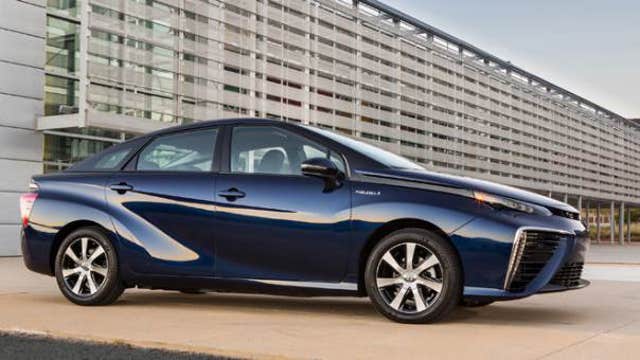Toyota Unveils Hydrogen-Powered Mirai
Toyota (NYSE:TM) unveiled a mid-size car that runs on hydrogen fuel cells, joining some of its rivals as they mark a new foray into alternative powertrains.
The world’s top seller of cars and trucks said Tuesday the 2016 Mirai will be available starting in the fall of 2015. Toyota expects to make only 700 of the vehicles next year. The Mirai—a Japanese word that translates to “future”—will be rolled out at select dealers that have hydrogen fueling stations nearby.
Toyota hopes the Mirai can attract drivers in the same way its Prius helped pave the way for hybrids and electric cars after launching in 1997. In five or six years, the automaker hopes to boost sales to the tens of thousands.
Fuel cell vehicles, which use hydrogen to generate electricity, offer better range than most plug-in cars. Toyota is making a bet that consumers who have concerns about making longer trips in electric cars will find more to like in the Mirai.
The Mirai can travel up to 300 miles on a single tank, and it takes about five minutes to fill up. That puts the Mirai ahead of Tesla Motors’ (NASDAQ:TSLA) Model S, which currently leads other electric vehicles with a range of 265 miles.
Toyota will offer the Mirai with a price tag of $57,500 or a lease of $499 a month, while the Model S costs at least $81,000 before federal tax incentives. The Mirai is eligible for an $8,000 tax credit and some state incentives, according to Toyota.
The announcement was made ahead of the Los Angeles Auto Show, which officially begins Friday. Shares of Toyota rose 1.3% to $120.10 in midday trading Tuesday.
Hyundai has already launched a hydrogen-powered Tucson sport-utility vehicle. By the end of the year, Hyundai expects to have 60 units sold in California.
Other manufacturers are working of fuel cell cars as well. Honda (NYSE:GM) is working alongside General Motors (NYSE:GM), while Ford Motor Co. (NYSE:F), Nissan and Daimler formed a partnership of their own. Toyota has a deal with BMW.
Earlier this week, Honda (NYSE:HMC) said it will delay the launch of its fuel cell vehicle until 2016 as part of a broader effort to keep costs in check.
Honda has faced numerous recalls over the last year, including ongoing repairs tied to faulty airbags made by Takata. Many of the world’s major automakers used the same airbags.




















